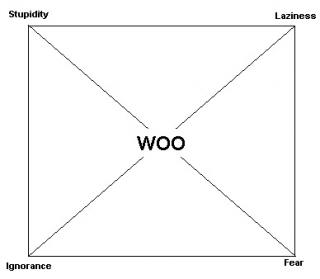Apologies for multiple posts. I usually try to avoid even double-posting, but I missed this one earlier and don't want to leave it hanging.
There is no independently tested hypothesis, or any sophisticated understanding of the subjective level of existence emergent in mind as manifest in humanity(other than anthropological studies, which again are observations of people).
By this I assume you mean that there is as of yet no concrete understanding of the mechanism that produces a "me".
This is true. However, we do know that this mechanism is material in nature. Earlier in this thread, PixyMisa posted links to studies which have shown that certain chemical alterations to the brain can result in the eradication of that "me". We know that the process is material in nature. We just don't yet know exactly what it is or which part of the brain does it.
Assumption based on observation and a reduction of subjective experience to convulsions of the physical brain.
No. Conclusion, based on the fact that, aside from the great strides we've been making in neuroscience and the lack of any sort of evidence for qualia turning up, there isn't even anything approaching a coherent definition for them.
Reference to magic is straw, you'll have to better than that.
It's a figure of speech, albeit an appropriate one.
In my opinion, idealism and other alternatives are functionally equivalent to magic - but that's a discussion for another time.
An argument is not required as all known instances of consciousness are emergent results of metabolic evolution.
Slight quibble: all known instances of
brains sophisticated enough to produce something that most people would acknowledge as a mind are the result of metabolic evolution.
Again, minds come from brains. There is nothing in the definition of "brain" that means it has to be made of squishy meat bits.
Note, I have repeatedly pointed out that I make a distinction between consciousness and mind, consciousness is metabolic, mind is self conscious processing of subjective abstractions.
My mistake. Can you repost your definition of "consciousness" so that I better understand you in future?
Nonsense, until materialism provides a thorough description and explanation of a genuine ontology, a rational person may freely consider alternative ontologies.
Ignoring for the moment the fact that materialism can and does provide a - in fact, the
only - functional description of
anything, geocentrism was never a rational choice, even before heliocentrism was put forth.
No, the proof we use between other human beings is a realisation that they are essentially clones of one life form, hence virtually identical.
Perhaps that is the proof
you use. It does not change the fact that the one I gave is the only one that functions in all situations.
Because that's what "is" means.
Straw, I presume you are referring to the ingredient in the mix specifically requiring an idealist ontology. There is none, as ontologies which ever is the genuine one, results in exactly the same phenomena in the world.
The difference is that, in an idealistic universe, there is
no reason for anything to behave in
any given way, let alone one that matches so perfectly to a materialistic universe.
To argue for idealism in this circumstance is special pleading.
Yes, just like philosophical zombies. How will we know that said AI are zombies or sentient?
P-zombies are an incoherent concept. An entity which behaves in all situations exactly as though it is conscious
is conscious. Again, that is the definition of "is". To say "a p-zombie behaves in all situations indistinguishably from a conscious entity, but is not a conscious entity" is gibberish. You might as well say "it's blue, but it's not blue".
These are little more than caricatures of the issue.
They're really not. See my responses to LarryS.


